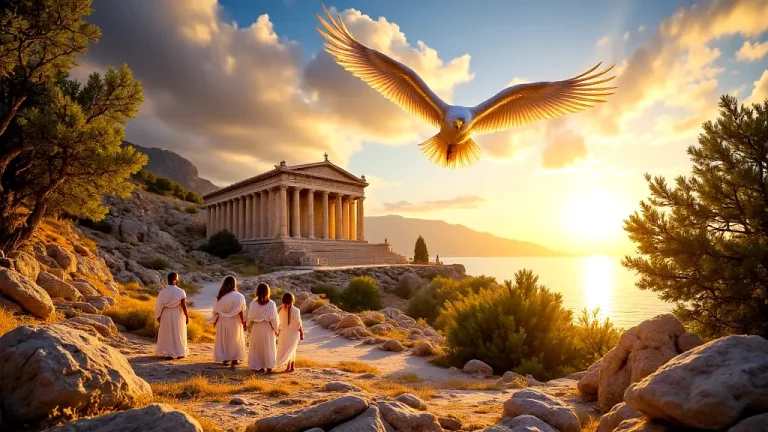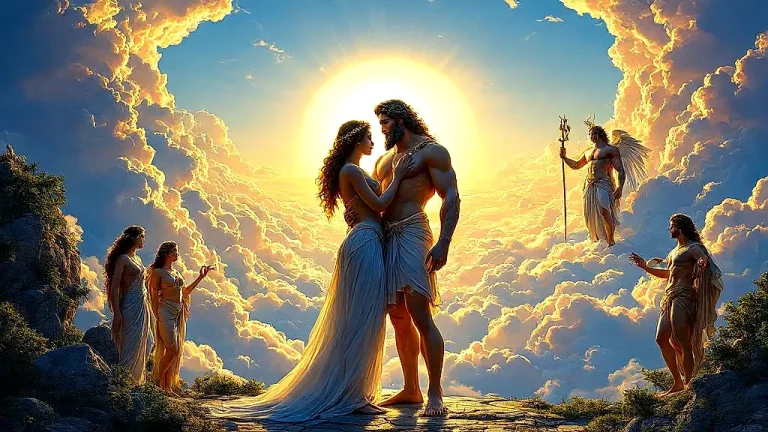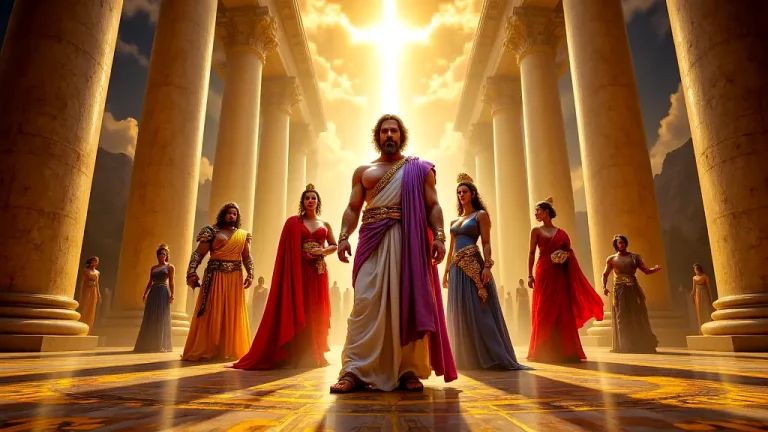Ekecheiria: The Greek God Of Truce And Olympic Peace
In how Greek stories are told, Ekecheiria appears as an interesting example of stopping fights and getting along, especially in the time of the old Olympic Games. Imagine it. A place where common wars were paused because a higher decision said so, letting games go on and people watch in calmness.
Key Points:
- Ekecheiria was a godly truce in Greek myths, central to the Olympics.
- It brought peace among Greek city-states during the Games.
- In art, it means peace and unity, seen in pottery and statues.
- It had a spiritual side, with temples and offerings to Zeus.
- Ekecheiria influenced modern peace ideas, seen in the Olympic Truce.
- Greek writings often meant peace through stories like the Iliad.
- It still means something today in books, movies, and art showing peace.
This whole thing meant peace wasn’t just a story idea but also a working plan that changed people’s lives and power deals in old Greece. From the stories that began it all, to how it still matters today when we think about getting along, Ekecheiria is a different way to think about stories, how people live, and talking it out.
Ekecheiria: Overview and Key Facts
| Key Aspect | Description |
|---|---|
| Origin | From Greek myths, Ekecheiria means a truce backed by gods, linked to old Olympic events. |
| Mythology Role | In myths, it was an example of peace. Because of this, wars stopped, and people could safely go to the Games. |
| Olympics Connection | At the center of Olympic truces, it helped bring people together and stop fights between Greek areas during games. |
| Cultural Meaning | Important for starting talks and sharing between places in ancient Greece. |
| Impact on History | Ekecheiria helped in making worldwide deals for peace and gave ideas to handle fights today. |
| Seen in Art | Often in art from old Greece, it was shown on things like pots and statues, showing it was important. |
| Today’s Legacy | Even now, the impact of Ekecheiria is seen in peace efforts and new Olympic values. |
Where Ekecheiria Comes From
To really get what Ekecheiria means, we must look into its mythical beginnings and see how it connected with the ancient Olympic Games. For finding out about this, we look at its story and then, understand the link to these Games.
Ekecheiria’s Mythical Beginnings
In Greek myths, Ekecheiria comes out as a godly example of stopping fights, connected tightly to the old Olympics. The start of Ekecheiria, where the Greek city-states needed a peaceful place, really had to stand out among all the wars and scrapes that kept happening. Imagine a world. Like a modern stop in battles, there was this special truce, so athletes and watchers traveled safely to Olympia.
It wasn’t just people deciding, though. The gods, they said yes to this, which showed how much it mattered. For those Games, to honor Zeus, was when the places put down fights, they got together, celebrated games, and traded ideas. So, Ekecheiria wasn’t only a myth; it was a useful way to make this all happen.
The help Ekecheiria gave to peace in these Games was big. At this time, the battling groups in Greece would pause fights for a while, getting some calm. This godly truce kept the Games going and let players play without worrying about danger.

Lots of stories and tales stress how important Ekecheiria was, like the story of Iphitos, king of Elis, who, legends say, was told by the Oracle of Delphi to make this peace happen to keep the Games safe. There’s also the tale of king Lycurgus from Sparta, who’s said to put the truce into practice alongside Iphitos.
These stories mean Ekecheiria mattered hugely in culture, showing it as peace’s face and teamwork in Greek life.
Ekecheiria was a crucial truce during the ancient Olympics, allowing athletes to compete safely by pausing wars and fostering peace among Greek city-states.
Ekecheiria and the Olympic Truce
Ekecheiria, often called the Olympics Truce, was a key part of those old Olympic Games and needed peace among often-fighting Greek cities. Imagine in those times, like a modern peace deal, where groups at odds stopped fighting so athletes could safely get to Olympia. This truce wasn’t just a human deal. The gods gave this order, meaning it was really important.
In history, this truce was big in making groups work together since it gave a chance for trading ideas and diplomacy in a time full of fights. Ekecheiria made sure Games could happen without worrying about wars, pointing out its role in keeping the Games strong.
By keeping peace, the Olympics Truce made it easier to celebrate athletic skills and the common values of the Greek world.
How Ekecheiria Changed Over Time
When we look at how the history of Ekecheiria changed, it is interesting to see what this idea became as years passed, and it means how life and thoughts in ancient Greek society shifted around.
Ekecheiria Through the Ages
The idea of Ekecheiria, coming from the stories of ancient Greece, changed a lot as it became a part of society. At first, Ekecheiria had its roots in mythological tales, viewed as a holy peace approved by the gods to keep things calm for the Olympics. This godly order gave it an untouchable nature, making it useful for keeping harmony among the often-arguing Greek city-states.
And when the Games became more popular, the importance of Ekecheiria appeared more clearly, acting as a sign of unity and team spirit. Over time, it changed from just a religious thing to a more organized agreement, which shows how Greek life got more complex. Like modern laws changing with times, the Greeks adapted Ekecheiria for their shifting world.
As time went by, Ekecheiria kept adapting. Because Greek society and the Mediterranean changed, what this peace meant also grew. The truce was still about ensuring peace during the Games, but it started having new meanings, becoming a tool for city-states to fix problems outside sports. This flexibility indicates how Ekecheiria was strong as a cultural rule, able to change and face new challenges and openings.
Warfare and politics in Greece needed ideas that kept up, making the truce stay suitable for a changing world. Looking at how Ekecheiria went through history, we see ways old societies dealt with peace and fights, showing lessons that matter even now.
Ekecheiria in Other Stories
When we look at the idea of Ekecheiria, it is interesting to see how it is like other peace ideas in stories from the Norse and Egyptians. Like in Norse myths, there is an idea about peace when gods meet at the Thing, a meeting where they fix problems and make rules. This is similar to Ekecheiria because both stop fighting for important group activities.
And in Egyptian myths, the goddess Ma’at stands for truth, balance, and order, keeping peace in the kingdom. Even if it is not a truce like Ekecheiria, Ma’at’s role in keeping order shows a similar need for peace and stability. These stories are different but share this goal for peace.

Ekecheiria in Everyday Greek Life
After looking at Ekecheiria’s roots and similar ideas in other cultures, now we can see how this idea was part of daily Greek life, so it affected their rules and what they did each day.
Ekecheiria as a Peace Symbol
Ekecheiria, seen as a peace symbol, was important in Greek society, like how the olive branch means peace now. It symbolized a sacred pause in fighting, and city-states came together for cooperation and shared cultural ties.
The truce did not just mean stopping wars; it was a powerful sign that peace was possible even when there was a lot of difference. The effects on society were big, and different parts of Greek life felt it. For instance, it made diplomatic talks possible, providing a neutral area for leaders to speak without fearing war. Moreover, it pushed cultural exchange and respect between the city-states, building a feeling of shared identity. Here is a list of Ekecheiria’s impacts on society:
- Political Influence: It made treaties happen and allowed talks during the truce.
- Cultural Exchange: Promoted getting along and understanding between Greek areas.
- Social Unity: Built shared cultural and religious identity.
Because of these impacts, Ekecheiria was super important for keeping peace and building unity in ancient Greece.
Ekecheiria, a symbol of peace in ancient Greece, was important because it stopped wars temporarily, allowed leaders to talk, and encouraged cultural exchange, creating a sense of unity among city-states.
Spiritual Side of Ekecheiria
The spiritual part of Ekecheiria meant it was a divine order for peace, showing the Greeks’ respect for harmony as a sacred job. In ancient Greece, Ekecheiria was more than just a simple truce. It was something spiritual that needed all city-states to join. The practices linked to Ekecheiria included giving offerings and saying prayers to the gods, especially Zeus, who was the top judge of peace and justice.
These practices were similar to modern peace events where people join to pray for getting along. For the Greeks, following Ekecheiria helped make sure the gods liked their actions and blessed their meetings. This spiritual part added seriousness to the truce, making it important in both religious and social ways. Temples and altars for Ekecheiria were very important in Greek religion.
They were places for worship and gathering. These sacred places were near where the Olympic Games took place, meaning the link between sports and peace from the gods. The altars, much like today’s peace monuments, were spots where people could offer sacrifices and ask gods for peace in conflicts. Having these religious places showed how important Ekecheiria was to the Greeks, acting as a clear reminder of the holy nature of the truce.
By honoring Ekecheiria through these temples and altars, the Greeks not only respected their gods but also pushed their cultural values of unity and working together, which were crucial for how they lived.
Ekecheiria in Art and Stories
After we looked at the spiritual sides of Ekecheiria, now we focus on how this idea got made part of art and stories in old Greece, which means it’s still important to their culture.
How Ekecheiria Shows Up in Ancient Art
In ancient Greek art, Ekecheiria means peace and stopping fights by using symbols and showing this in statues and pots. Artists included scenes of getting along and working together, which appear as the social ideas of Ekecheiria. In stories seen on pottery, for example, athletes shake hands, or city-states give each other olive branches, which people still know as signs of peace.
These objects and images were not just nice to look at; they were ways to mean that Ekecheiria mattered for keeping social balance and bringing people together. We can compare it to today when artworks might use doves or peace marks to mean getting along. Back then, Greek artists used their tools to make the idea of Ekecheiria real forever.
Here is a table to look at different kinds of art and what they meant historically:

| Artistic Representation | Medium | Historical Significance |
|---|---|---|
| Athlete Handshake | Pottery | Unity and fair competition during the Olympics. |
| Olive Branch Exchange | Sculpture | Peace treaties between city-states. |
| Peaceful Gatherings | Frescoes | Showed communal harmony and religious practices. |
These pictures and statues not only meant the idea of Ekecheiria but also stressed its part as a key to Greek culture, showing viewers that peace and working together are strong and lasting ideas.
Ekecheiria in Greek Writings
Across Greek writings, Ekecheiria is mentioned in old poems and plays, where it highlights its role in the culture and religion of Greece. Writers like Homer do not directly say Ekecheiria, but they often mean truce and peace, like during the big events such as the Olympic Games.
These stories were used to tell ideas about getting along and working together. Just like today, where books might talk about peace to mean social ideas. In the Iliad, for instance, stopping fights in battles means there is respect for the gods’ order of peace, much like how Ekecheiria is seen at the Olympic Games.
So, by putting these in stories, the idea of Ekecheiria stays in the way people think, making it a rule from gods and in culture. The respect for Ekecheiria in Greek writings added a lot to how it was seen and continued as a respected custom.
By using ideas of stopping fights in their stories, writers made their audiences learn and think about peace. These works connected stories and real life, making peace real every day. In Euripides’ plays, for example, solving problems with words instead of war matches the idea of Ekecheiria, which says peace is a gift from the gods, to be loved and kept.
Through their stories, Greek literature helped keep the importance of Ekecheiria, ensuring its legacy lasts for all time to come.
Ekecheiria’s Lasting Impact
After we looked at how Ekecheiria appears in art and books, now we will look closely at how it still has a long-term effect on today’s ideas of peace and solving disagreements.
Ekecheiria’s Influence on Today’s Ideas of Peace
The story of Ekecheiria has greatly affected today’s ideas about peace and how people settle fights, working as a reminder that doesn’t go away of what it means to pause fighting and get along. In many cases now, the basics of Ekecheiria can be observed in global attempts to create ceasefires and peace deals. This is when fighting groups agree to stop fighting to talk and work things out.
Just like in ancient Greece, where during the Olympic Games people paused their battles, today’s nations might seek a break in hostilities to allow for talks and help for those in need. This old idea has been updated for today, making clear how the basic ideas of Ekecheiria still find meaning when we look for global harmony.
Modern activities and groups have also taken lessons from the idea of Ekecheiria, which shows its lasting importance. For example, the International Olympic Committee suggests the Olympic Truce, asking countries to stop fighting during the Olympic Games, and this is directly tied to the old tradition of Ekecheiria.

Additionally, world peace campaigns, like the United Nations working to settle disputes and support lasting peace, remind us of the spirit of Ekecheiria by focusing on talks and teamwork, not on fighting. These cases mean how the Greek old idea of peace goes beyond its time, impacting today’s ways of solving clashes and building a world that’s more about getting along.
Ekecheiria’s ancient idea of pausing fights for peace during the Olympics still impacts modern efforts for ceasefires and global harmony, influencing peace talks and organizations like the UN and the International Olympic Committee.
Ekecheiria in Today’s Media
Based on how Ekecheiria affects modern peace work, we should see how this old idea means something in today’s media and stories.
Ekecheiria in Modern Culture
The lasting story of Ekecheiria appears clearly in today’s media, where ideas about peace and stopping fights are put into films, books, and art that connect with people now. In movies about wartime breaks or getting along again, the same spirit of Ekecheiria can be seen, making it clear how old ideas fit into today’s stories.
Books that go into settling arguments and talking things out take ideas from this old Greek tradition, and they give readers ways to see why peace matters today. In art, work and displays that mark the end of fighting and celebrate coming together often point to the values of Ekecheiria, so we remember how it’s important through time.
These stories not only keep what Ekecheiria stands for alive but also mean a lot as a sign of hope and getting along in a world that keeps changing.
Pantheon of Greek Spirits and Daimones
In many stories of Greek mythology, spirits and daimones have a special place, working as go-betweens among the gods and people, and they often take on specific parts of life and nature. These beings range from kind helpers to harmful forces, playing important parts in the stories, and they affect both people’s lives and the outcomes of godly fights.
For people who want to see all the different sides of these interesting beings, a full list of all the Greek Spirits and Daimones gives a clear look into their traits and stories.
This resource is useful for anyone eager to jump deeper into the complex world of Greek mythology, where each spirit and daimon adds to the big ideas of fate, morality, and what it means to be human.
FAQs
1. What was the primary role of Ekecheiria in Greek mythology?
The primary role of Ekecheiria in Greek mythology was to embody and enforce the sacred truce during the ancient Olympic Games, ensuring peace among participating city-states.
2. How did Ekecheiria influence the ancient Olympic Games?
Ekecheiria influenced the ancient Olympic Games by establishing a sacred truce that ensured safe passage for athletes and spectators, promoting peace and unity during the event.
3. Are there any modern equivalents to Ekecheiria in contemporary culture?
Modern equivalents to Ekecheiria in contemporary culture include initiatives like the Olympic Truce and various international peace treaties that aim to promote global harmony and ceasefire during significant events.
4. What are some famous myths involving Ekecheiria?
Some famous myths involving Ekecheiria include its role in establishing the Olympic Truce, which allowed athletes and spectators to travel safely to the ancient Olympic Games.







